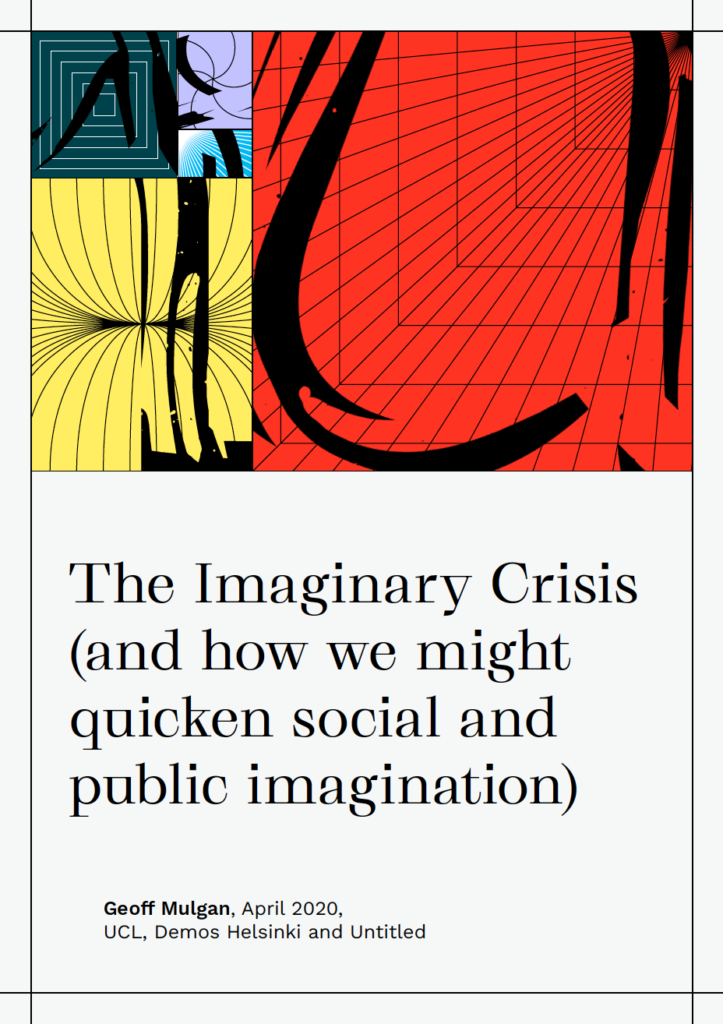We find it easy to imagine apocalypse and disaster; or to imagine new generations of technology. But we find it much harder than in the past to imagine a better society a generation or more into the future. In this paper, Demos Helsinki Fellow Geoff Mulgan sets out thoughts on what, how, and who to address this gap.
We are in the midst of a very urgent, real, global and deadly crisis. But as the Covid-19 crisis hopefully comes slowly under control, we ought to attend to a very different kind of crisis, and one which is scarcely visible: the deteriorating state of our shared social imagination. That is the subject of this paper.
The world faces a deficit of social imagination. We find it easy to imagine apocalypse and disaster; or to imagine new generations of technology. But we find it much harder than in the past to imagine a better society a generation or more into the future.
Some fields are good at thinking far into the future – business invests heavily in visions of future smart homes, smart cities or health. Fiction is adept at exploring the future boundaries of humans and technology. Mainstream culture finds it easy to imagine apocalypses – what would happen if temperatures rose 4 or 5 degrees or AI enslaved humans or even worse pandemics became the norm?
But we struggle to imagine positive alternatives: what our care or education systems, welfare, workplaces, democracy or neighbourhoods might be like in 30-40 years. And we appear to be worse at doing this than in the past.
There are many possible reasons for this decline; loss of confidence in progress and grand narratives; declining imaginative capacity; slowing down of innovation. Key institutions – universities, political parties and thinktanks – have for different reasons vacated this space. The decline of imagination matters because societies need a wide range of ideas and options to help them adjust, particularly to big challenges like climate change and ageing.
Making sense of social imagination
Social imagination has a long and fascinating history, from utopias to political programmes, model communities to generative ideas and fictions which fuelled our ability to understand and then shape human progress.
There are many methods available which can be used to stimulate imagination – sparking creativity or cultivating estrangement from dominant beliefs. The most interesting social imagination is often dialectical in that it simultaneously goes with, and against, the grain of historical trends.
To fuel social imagination we need to engage the many institutions that could be supporting it, but don’t now: research funders; foundations; universities and governments. And we need to remember the promise of reviving shared social imagination: that communities can once again become heroes in their own history rather than only observers.
So what can be done to address this gap? This is a huge task, involving many people, organisations and methods. In this paper, Demos Helsinki Fellow Geoff Mulgan sets out thoughts on the what, the how and the who.
Spark your social imagination and download the full paper, or read the abridged version.

Our initiative UNTITLED is a decade-long process of social imagination and experimentation to bring out the next era.
Learn more about UNTITLED here: untitled.community/


Loops for Wisdom
Publication
May 4, 2021
Steering through capability
Publication
December 11, 2020
Moving Towards a 21st Century Government: From Reimagination to Transformation
Publication
November 10, 2021
What happens next?
Post
March 16, 2021
The future does not exist
Post
September 7, 2021
For a wellbeing economy, we need to transform governance
Post
March 31, 2023
How to introduce a wellbeing economy model
Post
June 30, 2022
Public Governance Must Be Able to Imagine a Better Future
Post
June 9, 2020
How to reveal alternative futures for nations?
Post
September 21, 2015
Foresight enables to prepare for crises but also look beyond them
Post
April 2, 2020
How do you change government from reactive to proactive?
Post
March 4, 2015
To change system settings, click here.
Publication
February 15, 2023
Vision Paper: Empowering Governments to Steer the 21st Century
Publication
February 10, 2019
The future of democracy and welfare in Europe: 4 scenarios for 2040
Publication
August 1, 2022
BIBU – Tackling Biases and Bubbles in Participation
Project
April 3, 2018
NextEra London: A New Vision For Democracy
Project
March 29, 2017
The NextEra – A Global Initiative for an Open and Forward Looking Society
Project
December 7, 2016
TANDEM: Citizens envisioning a just transition
Project
January 10, 2023
A time to build – shaping the next generation of public institutions
Post
December 19, 2024
New research aims to define what “successful AI” means in society (FORSEE)
Project
April 17, 2025
Cassandra initiative
Page
May 7, 2025
Imaginaries on Sustainability Transformation – Report outlines three positive futures
Post
May 19, 2025
Governing with citizens: Embedding democratic innovations into societies
Publication
April 22, 2025
Master class: Institutionalising for impact
Event
February 13, 2026